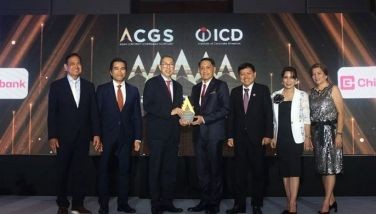Promoting the science of early child development
August 29, 2002 | 12:00am
Most households are familiar with this scenario: the parents are busy earning a living away from home most of the day, leaving the children alone or with their caretakers.
If the little ones happen to be three years old and below, there is more cause for concern than just lack of quality time; they may actually be missing out on many aspects of childhood development that can occur during their formative years.
Although there are many ideas on parenting, identifying them concretely and implementing them properly can be difficult, especially in an increasingly hectic society that demands so much time division among families.
It was only recently that Mead Johnson, one of the world’s leading manufacturers of infant formula milk products, was able to gather decades of research on human growth, brain development and stimulating factors, and assemble a "package" dubbed as the Smart System of Early Childhood Development. This will enable parents – and the public in general – to understand and apply the basic principles that will enhance the total development of children.
Interestingly, it took two renowned Thai doctors – a neuroscientist and a pediatrician – to help Mead Johnson promote the fundamentals of the Smart System of Early Childhood Development to doctors in the Philippines.
Niaphinich Kotchabhakdi, director of the Neuro-Behavioral Biology Center of the Institute of Science and Technology for Development, was recently in town with his wife, Nittaya Kotchabhakdi, director of the National Institute for Child and Family Development, to share the principles underlying the Smart System that they have developed.
"The Smart System is, in a way, a distillation of all the decades of studies done on childhood and brain development and nutrition," said Naiphinich. "It is a combination of Smart Nutrition, Smart Play, Smart Symphony and Smart Language, all products of a lot of evidence-based information put together in a nice package."
Mead Johnson has tapped the husband-wife team because of their extensive range of expertise in their respective yet interwoven fields. Nittaya, for instance, has reaped numerous awards and recognition both locally and internationally, and have fulfilled appointments, one of which was as resource person in the UNICEF Global Seminar on Early Childhood Development at the International Child Development Center in Italy.
Naiphinich, on the other hand, has participated in equally numerous academic appointments and activities, including memberships in professional societies such as the European Neuroscience Association, American Association for the Advancement of Science and the New York Academy of Science, to name a few.
"We have been involved in the development of Smart System since 1999," explained Naiphinich. "Prior to this, Mead Johnson in the US launched the first project, Smart Symphony, which is based on accumulating evidence that music, particularly classical music, can help stimulate brain development, especially in the area of spatial-temporal learning."
Numerous tests were done to validate this finding, one example of which was done by California doctors between two groups of students, wherein the group exposed to a Mozart symphony scored higher than the other group exposed to contemporary rock music.
Similar tests conducted by a graduate student of Naiphinich’s in Thailand, this time done on comatose patients who showed remarkable response to classical music, validated the acceptability of certain compositions as developmental aides.
"After the US, Thailand is the second country that has had this experience with this study on the effects of classical music. This was partly why Mead Johnson decided to launch Smart Symphony there," he said.
Nittaya, meanwhile, shared the practical points of using music with children. "I gave some examples of children in our day care center," she said. "We found that with classical music, they could relax and concentrate better on their toys, they were able to eat meals well, and they took less time to fall asleep."
Interaction, apparently, is the underlying factor among the other components of Smart System. "We’ve learned in the last 10 to 20 years that babies start to have sensory perception even before birth," she explained. "We understand that the more the child has a chance to interact with the environment, with people, with toys and other activities, the better are his chances to develop motor skills, cognitive facilities, and also psychosocial aspects."
Nittaya cited the situation in her country wherein children are mostly left at home, in front of the TV, with nobody to pay them much attention, much less provide models for a better environment.
"This is where Smart Play can come in," she said. "In our examination of children and education of their parents, we incorporate also the need for developmentally appropriate toys and activities, including reading materials. Toys can be commercial or homemade, as long as they are designed to foster interactivity between children and their parents. This will help the children advance from simple activities to more complex ones, bring out creativity and enable them to solve more difficult problems in the future."
Another problem area of Thai children, she said, was language acquisition. "There are many instances of children who have not been properly trained to speak the Thai language. In general, language acquisition needs interactive association. You should, for instance, use complete sentences when talking to children, so they will understand and appreciate the richness of verbal stimulation." Both of them stressed the importance of achieving all these early in the life of a child. "It should be done very early in life, at the time when the brain is still developing, especially in the case of language," said Naiphinich. "There’s a very limited window of opportunity, such that if you delay it, the desired effect won’t be the same."
Of all the components of Smart System, the most fundamental is, of course, Nutrition. Being a neuroscientist, he has done research on how food sources can directly affect brain and body development. He cites the function of one ingredient – Docosahexaenoic Acid or DHA – in this area.
"DHA is a very important component of the brain and retina. Since the retina is actually an extension of the brain, it’s not surprising to find it sharing with the latter the need for essential lipids for development," he said.
Breast milk, he said, is the best source of DHA, followed by other natural sources such as fish oil and other vegetables. Whether going for natural or enhanced sources though, "what is important is that infants who receive DHA supplements, at the appropriate levels, experience faster development of the brain," he said.
Both Naiphinich and Nittaya are pleased to note the successful implementation of the Smart System in the Philippines, which began as soon as it was launched in Thailand.
"After the launch in our country, Mead Johnson organized the training of a group of Philippine doctors in Thailand. We exposed them to the concept, the practicality and the positive impact, and today, it’s being successfully done in many parts of the Philippines," said Nittaya.
If the little ones happen to be three years old and below, there is more cause for concern than just lack of quality time; they may actually be missing out on many aspects of childhood development that can occur during their formative years.
Although there are many ideas on parenting, identifying them concretely and implementing them properly can be difficult, especially in an increasingly hectic society that demands so much time division among families.
It was only recently that Mead Johnson, one of the world’s leading manufacturers of infant formula milk products, was able to gather decades of research on human growth, brain development and stimulating factors, and assemble a "package" dubbed as the Smart System of Early Childhood Development. This will enable parents – and the public in general – to understand and apply the basic principles that will enhance the total development of children.
Niaphinich Kotchabhakdi, director of the Neuro-Behavioral Biology Center of the Institute of Science and Technology for Development, was recently in town with his wife, Nittaya Kotchabhakdi, director of the National Institute for Child and Family Development, to share the principles underlying the Smart System that they have developed.
"The Smart System is, in a way, a distillation of all the decades of studies done on childhood and brain development and nutrition," said Naiphinich. "It is a combination of Smart Nutrition, Smart Play, Smart Symphony and Smart Language, all products of a lot of evidence-based information put together in a nice package."
Mead Johnson has tapped the husband-wife team because of their extensive range of expertise in their respective yet interwoven fields. Nittaya, for instance, has reaped numerous awards and recognition both locally and internationally, and have fulfilled appointments, one of which was as resource person in the UNICEF Global Seminar on Early Childhood Development at the International Child Development Center in Italy.
Naiphinich, on the other hand, has participated in equally numerous academic appointments and activities, including memberships in professional societies such as the European Neuroscience Association, American Association for the Advancement of Science and the New York Academy of Science, to name a few.
Numerous tests were done to validate this finding, one example of which was done by California doctors between two groups of students, wherein the group exposed to a Mozart symphony scored higher than the other group exposed to contemporary rock music.
Similar tests conducted by a graduate student of Naiphinich’s in Thailand, this time done on comatose patients who showed remarkable response to classical music, validated the acceptability of certain compositions as developmental aides.
"After the US, Thailand is the second country that has had this experience with this study on the effects of classical music. This was partly why Mead Johnson decided to launch Smart Symphony there," he said.
Nittaya, meanwhile, shared the practical points of using music with children. "I gave some examples of children in our day care center," she said. "We found that with classical music, they could relax and concentrate better on their toys, they were able to eat meals well, and they took less time to fall asleep."
Nittaya cited the situation in her country wherein children are mostly left at home, in front of the TV, with nobody to pay them much attention, much less provide models for a better environment.
"This is where Smart Play can come in," she said. "In our examination of children and education of their parents, we incorporate also the need for developmentally appropriate toys and activities, including reading materials. Toys can be commercial or homemade, as long as they are designed to foster interactivity between children and their parents. This will help the children advance from simple activities to more complex ones, bring out creativity and enable them to solve more difficult problems in the future."
Another problem area of Thai children, she said, was language acquisition. "There are many instances of children who have not been properly trained to speak the Thai language. In general, language acquisition needs interactive association. You should, for instance, use complete sentences when talking to children, so they will understand and appreciate the richness of verbal stimulation." Both of them stressed the importance of achieving all these early in the life of a child. "It should be done very early in life, at the time when the brain is still developing, especially in the case of language," said Naiphinich. "There’s a very limited window of opportunity, such that if you delay it, the desired effect won’t be the same."
"DHA is a very important component of the brain and retina. Since the retina is actually an extension of the brain, it’s not surprising to find it sharing with the latter the need for essential lipids for development," he said.
Breast milk, he said, is the best source of DHA, followed by other natural sources such as fish oil and other vegetables. Whether going for natural or enhanced sources though, "what is important is that infants who receive DHA supplements, at the appropriate levels, experience faster development of the brain," he said.
Both Naiphinich and Nittaya are pleased to note the successful implementation of the Smart System in the Philippines, which began as soon as it was launched in Thailand.
"After the launch in our country, Mead Johnson organized the training of a group of Philippine doctors in Thailand. We exposed them to the concept, the practicality and the positive impact, and today, it’s being successfully done in many parts of the Philippines," said Nittaya.
BrandSpace Articles
<
>
- Latest
Latest
Latest
June 10, 2024 - 11:45am
June 10, 2024 - 11:45am
May 10, 2024 - 8:00am
May 10, 2024 - 8:00am
April 12, 2024 - 11:43am
By Huw Griffith | April 12, 2024 - 11:43am
Recommended

























 Partner
Partner




